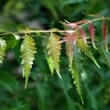Background
- Neem has a long history of use in India. The leaf and bark extracts were recommended by herbal practitioners for gastrointestinal upsets, skin ulcers, infections and malaria. Neem twigs were used regularly as toothbrushes, and the leaf gel was used to fight periodontal disease (inflammatory disease of the gum).
- The extracts from neem often have a pungent smell similar to garlic. This is because they contain sulfurous compounds. Neem has been reported to reduce plaque formation, act as a mosquito repellent, treat psoriasis vulgaris (chronic skin disease with reddened lesions covered by silvery scales) and aid in the healing of gastroduodenal ulcers. However, there is currently insufficient evidence to recommend for or against these uses. In the United States, neem is used mainly for its antibacterial, antifungal, insect repellant, contraceptive, and hypothetical "life extension" qualities.
References
- Arivazhagan S, Velmurugan B, Bhuvaneswari V, and Nagini S. Effects of aqueous extracts of garlic (Allium sativum) and neem (Azadirachta indica) leaf on hepatic and blood oxidant-antioxidant status during experimental gastric carcinogenesis. J Med Food 2004;7(3):334-339.
View Abstract - Bandyopadhyay U, Biswas K, Sengupta A, et al. Clinical studies on the effect of Neem (Azadirachta indica) bark extract on gastric secretion and gastroduodenal ulcer. Life Sci. 10-29-2004;75(24):2867-2878.
View Abstract - Bhanwra S, Singh J, Khosla P. Effect of Azadirachta indica (Neem) leaf aqueous extract on paracetamol-induced liver damage in rats. Indian J Physiol Pharmacol 2000;44(1):64-68.
View Abstract - Garg S, Talwar GP, Upadhyay SN. Immunocontraceptive activity guided fractionation and characterization of active constituents of neem (Azadirachta indica) seed extracts. J Ethnopharmacol 1998;60(3):235-246.
View Abstract - Mukherjee S, Garg S, Talwar GP. Early post implantation contraceptive effects of a purified fraction of neem (Azadirachta indica) seeds, given orally in rats: possible mechanisms involved. J Ethnopharmacol 11-30-1999;67(3):287-296.
View Abstract - Omar S, Zhang J, MacKinnon S, et al. Traditionally-used antimalarials from the Meliaceae. Curr Top Med Chem 2003;3(2):133-139.
View Abstract - Pai MR, Acharya LD, Udupa N. Evaluation of antiplaque activity of Azadirachta indica leaf extract gel--a 6-week clinical study. J.Ethnopharmacol. 2004;90(1):99-103.
View Abstract - Pai MR, Acharya LD, Udupa N. The effect of two different dental gels and a mouthwash on plaque and gingival scores: a six-week clinical study. Int.Dent.J 2004;54(4):219-223.
View Abstract - Panda S, Kar A. How safe is neem extract with respect to thyroid function in male mice? Pharmacol Res 2000;41(4):419-422.
View Abstract - Patel J, Hemavathi K, Bhatt Jagat D. Study of the antinociceptive effect of neem leaf extract and its interaction with morphine in mice. Indian J Pharmacol 2005;37(1):37-38.
- Raizada RB, Srivastava MK, Kaushal RA, et al. Azadirachtin, a neem biopesticide: subchronic toxicity assessment in rats. Food Chem Toxicol. 2001;39(5):477-483. . View Abstract
- SaiRam M, Ilavazhagan G, Sharma SK, et al. Anti-microbial activity of a new vaginal contraceptive NIM-76 from neem oil (Azadirachta indica). J Ethnopharmacol 2000;71(3):377-382. . View Abstract
- Siddiqui BS, Afshan F, Gulzar T, et al. Tetracyclic triterpenoids from the leaves of Azadirachta indica. Phytochemistry 2004;65(16):2363-2367.
View Abstract - Sinniah D, Baskaran G. Margosa oil poisoning as a cause of Reye's syndrome. Lancet 2-28-1981;1(8218):487-489.
View Abstract - Vanka A, Tandon S, Rao SR, et al. The effect of indigenous Neem Azadirachta indica [correction of (Adirachta indica)] mouth wash on Streptococcus mutans and lactobacilli growth. Indian J.Dent.Res. 2001;12(3):133-144.
View Abstract







